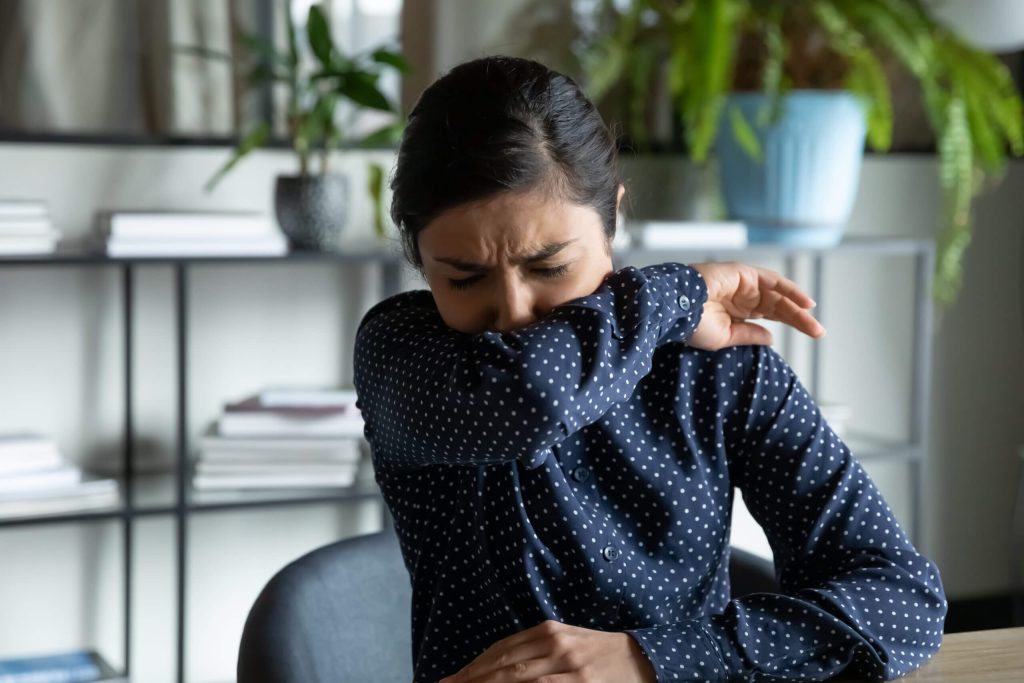Fits of coughing or the occasional clearing of your throat don’t usually cause pain except in the understandable areas of your throat and neck. However, sometimes your body reacts to the strain of coughing with pain in different areas, like the back, abdomen, or head.
Does this pain mean something else is wrong, or that your cough is causing undue strain on your spine or muscles? In most cases, pain when coughing goes away on its own, especially if you can stop coughing altogether. In other situations, however, it’s helpful to be seen by a professional who can help you reduce the pain you feel when coughing.
Potential causes of coughing pain
Coughing places sudden strain in multiple areas of the body, especially muscles and connective tissue in the chest, back, and shoulders. When combined with existing weaknesses or underlying conditions, this strain can result in pain, often in the back. A few reasons for why coughing may be causing or worsening pain include:
- Muscle strain or sprain: A forceful cough can strain the muscles that support your back, particularly if the coughing is frequent or intense.
- Spinal conditions: Conditions like herniated discs or arthritis may be aggravated by the pressure and sudden jerking motion of coughing. This can lead to sharp, localized pain in your back.
- Nerve irritation: The nervous system is complex, with your spine acting as its central highway. When a nerve is pinched or irritated, coughing can intensify back pain by increasing pressure around the nerve.
- Weak core muscles: Your core is responsible for stabilizing your body, and a weak core might not provide enough support when you cough. This can lead to discomfort in your lower back, as those muscles overcompensate.
If you’re experiencing persistent or severe back pain when you cough, it’s always a good idea to consult a healthcare professional.
Lower back pain when coughing
Lower back pain when coughing is particularly common, as the lower back supports much of your body’s weight and absorbs strain during movements like coughing. Here’s what could be going on:
- Herniated disc: If you have a herniated disc, the sudden force from coughing can compress the disc further, irritating nearby nerves and causing pain.
- Muscle overuse: Persistent or violent coughing can overwork the muscles in your lower back, leading to soreness or fatigue in these muscles that don’t normally get a targeted “workout.”
- Degenerative conditions: Degenerative disc disease and arthritis are more noticeable during activities that put pressure on the spine, like coughing.
Lower back pain triggered by coughing might benefit more from a targeted treatment, rather than hoping it goes away on its own. Physical therapy or simple at-home exercises can be effective at strengthening your core and back muscles to better absorb the force of coughing without radiating pain.
Upper back pain when coughing
Both lower and upper back pain when coughing are common, and they are frequently caused by similar conditions, just at a different area of the spine or back muscles. In addition to the reasons listed above for lower back pain, coughing that causes upper back pain may have something to do with:
- Tense shoulder or back muscles: The upper back (including your shoulder blades) often carries a lot of tension whether or not you’re using it to lift heavy loads every day. Frequent coughing might exacerbate already tight or tense muscles in this area.
- Spinal misalignment: If your spine isn’t properly aligned, the physical force of coughing can aggravate the imbalance, leading to sharp or aching upper back pain.
- Poor posture: Slouching or sitting with bad posture can weaken your upper back over time. When you cough, the area may respond with discomfort.
Treatments for coughing pain in the back
In most cases, coughing and back pain co-exist, so that when one goes away, the other stops as well. Because coughing typically resolves after an illness or goes away on its own, your back pain may get better once you stop coughing.
However, if your back pain was severe or continues after you’ve stopped coughing, it could be an indicator that one of the previously mentioned conditions could be affecting you.
Fortunately, many of the causes of back pain when coughing can be treated with simple physical therapy principles so future coughing fits don’t hurt.
Options for treating back pain and headaches include:
- Ice or heat therapy
- Targeted muscle stretching and strengthening
- Ergonomic adjustments
- Postural training
- Myofascial release
The goal of physical therapy for something like back pain when coughing is to strengthen and heal the areas of the body that hurt in those moments long before the next coughing fit. It’s about proactive wellness that prevents pain from starting in the first place.
Holistic healing from aches and pains at Peak Performance
If your back is hurting badly from coughing, the best thing you can do is find a way to limit your coughing, especially if you know you’re fighting an infection. Once you’re feeling better, you can talk to a physical therapist and get answers to why your back may have been tense, unbalanced, or weakened, and start on a plan to prevent this kind of pain from happening again.
Learn more about how we might be able to help by calling one of our clinics or requesting an appointment online today.
